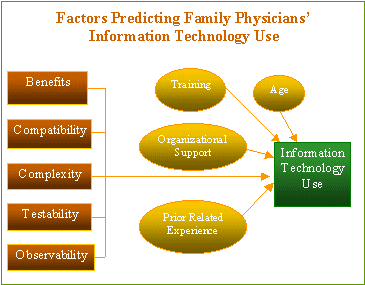Dr. Fiona Chew, Associate Professor, S.I. Newhouse School of Public Communications, Syracuse University, Syracuse, New York.
The American public relies on family physicians more than any other source for health information. As the "most credible" source for their patients, physicians require access to current, accurate medical and health promotion information. Information technology is increasingly becoming a critical part of this equation.

To this end, a CECHE-funded pilot project at Syracuse University looked at how well information technology serves family physicians' needs for patient health education and promotion and ways to update their knowledge. The 12-month study surveyed physicians' use of information technology and related media, including the Internet, television, conferences, pharmaceutical brochures and academic journals.
The Study
In spring 2002, a mail survey to assess information technology use in clinical practice was conducted among 101 primary-care and family-medicine physicians in Greater Syracuse. Backed by a predictability model, the four-page questionnaire asked physicians about their sources of medical information, optimal methods of communicating bioterrorist alerts by national health agencies, and perceptions of information technology. It focused on the use of computers and the Internet for clinical practice, as well as hand-held diagnostic computers and electronic patient records. E-mail communication with patients was also examined.
More than 60 percent responded. Over 70% were affiliated with a major teaching hospital. They comprised 58.6% male and 41.4% female, and a majority (55.1%) completed their professional training more than 10 years ago.
Results
Technological connectivity. Nearly all the physicians reported having computers at work — three-fourths with Internet access. Hand-held computers, which assist in clinical diagnosis, were used by almost 30% and desired by a similar proportion. Electronic record keeping was used by less than a fifth, although desired by half.
Patient communication, bioterrorism updates. About one in four physicians reported receiving e-mails from patients, with over 20% emailing back. In addition, 14.1% e-mailed medically important information to patients. E-mail was also cited by nearly 40% as the best method of obtaining up-to-date information on bioterrorism agents.
Sources of medical information. Continuing medical education was considered the most helpful in keeping family physicians up to date in their medical practice, followed by medical journals, professional colleagues and the American Academy of Family Physicians Web site.
Information technology perceptions. More than 90% of respondents reported using computers; however, fewer than half felt that their Internet skills were excellent. Nearly 80% agreed that their colleagues benefit from Internet use. A majority agreed that Internet use has improved clinical practice and has advantages, such as providing a lot of useful information.
Conclusion
The high prevalence of computer use and the Internet at work may reflect the large proportion of physicians in the sample that was affiliated with major teaching hospitals, where they often teach computer-literate medical students and residents. The current use of and interest in hand-held computers for clinical diagnosis and electronic record keeping may also reflect this trend. The proportion of physicians who reported receiving patient e-mail is consistent with national statistics.
Overall, the study revealed that family physicians who were more likely to perceive technology benefits, compatibility and ease of application integrated new information technology into their medical practices. In addition, most family physicians seemed aware of and to access the wealth of useful information available at specific Internet sites — thus confirming the value of online sources for these physicians. It is only a matter of time before a majority of physicians increasingly use information technology to improve their Internet skills, and provide better health education to their patients.